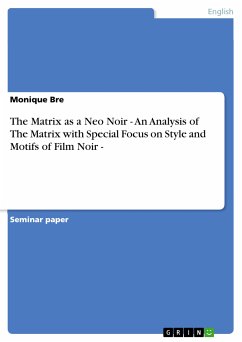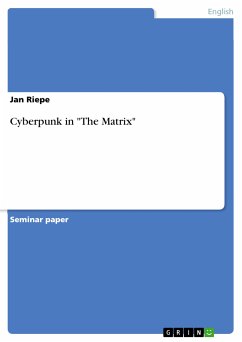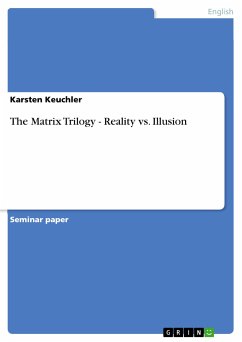Seminar paper from the year 2006 in the subject American Studies - Culture and Applied Geography, grade: 1,0, University of Innsbruck (Department of English Studies), course: Narrative Analysis of Literary Fiction and Fiction Film, language: English, abstract: The depiction of virtual realities seems to be very popular in modern film production. eXistenZ and Matrix are only two examples of films belonging to the genre of “cyberpunk”. This genre mainly deals with human beings and their bodies and their relationship to technology and their environment. There is a strong focus on the “anxiety over […] the technological creation of alternative realities and consequent loss of a stable perceptual ground for reflection” (Hotchkiss 19). Cyberpunk started as a subgenre of science fiction dealing with the “altering of the human body through pharmaceuticals and electronics” (Hotchkiss 19). This topic was quite poplar in the sixties and seventies when parts of the society were very suspicious of totalitarian corporate control. Cyberpunk reached its climax in the mid-eighties again dealing with the interfering of body and mind through “protheses, implanted circuitry, cosmetic surgery, genetic alteration, as well as brain- computer interfaces, artificial intelligence, [and] neurochemistry” (Hotchkiss 19). As mentioned both eXistenZ and Matrix deal with these virtual realities and their impact on human beings, though in different ways. In both films the characters travel to these virtual realities and back, but they have different motives, there is a different philosophy behind these transitions. As a consequence different filming techniques are used. In this paper I am going to analyze how these transitions between parallel realities are depicted and which effects are created through certain techniques. Furthermore other aspects concerning these transitions between parallel realities, such as the requirements to make such a transition possible, will be taken into consideration. My argumentation will be supported by certain scenes from the two films that can be found on the CD-ROM that is attached to this paper. In the text the reference to the clips is made like this: . These scenes and also the quotations of characters are taken from the DVDs of eXistenZ and Matrix that are listed in the bibliography. [DVD available: csaf3248@uibk.ac.at]
Bitte wählen Sie Ihr Anliegen aus.
Rechnungen
Retourenschein anfordern
Bestellstatus
Storno









